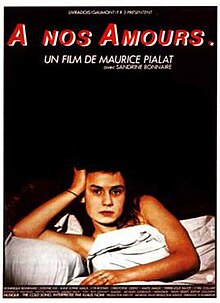À Nos Amours
- Sandrine Bonnaire: Suzanne
- Maurice Pialat: Suzanne's father
- Christophe Odent Michel
- Dominique Besnehard: Robert
- Cyril Collard Jean- Pierre
- Jacques Fieschi: Schwager
- Valérie Schlumberger: Marie -France
- Evelyne Ker: Suzanne's mother
- Pierre Novion: Adrien
- Tsilka Theodorou: Fanny
- Cyr Boitard: Luc
- Anne -Marie Nivelle: Jean- Pierre's mother
- Anne -Sophie Maille: Anne
- Pierre- Loup Rajot: Bernard
- Jean -Paul Camail: Angelo
- Maïté Maille: Martine
- Isabelle Prade: As long as
- Caroline Cibot: Charline
- Alexis Quentin Richard
- Hervé Austen: Freddy
- Alexandre De Dardel: Alex
- Vanghel Theodorou: Claude
- Caroline Legendre Géraldine
- Eric Viellard: Henri
- Tom Stevens: American
- Loïc Ermel: sailor
- Claude Blachowiak: sailor
- Nathalie Gureghian: Nathalie
- Paul Lugagne: Director
- Gwennolé Laurent: Teacher
On what we love is a French social drama by Maurice Pialat from 1983.
Action
Suzanne is 16 years old and spends her summer vacation with friends at summer camp. Here she rehearses Do not Play with the love of Alfred de Musset one. Her older brother is taking a boat ride with her and believes she well cared for locally. However, Suzanne escapes around other times from the summer camp and meets secretly with her boyfriend Luc, with whom she never sleeps. Evening at the dance, she meets an American, though she hardly knows, with whom she still sleeps in the same night. In the morning she has a guilty conscience about Luc and is stunned that the Americans act as if he does not know them. Soon the holidays are over. Suzanne lives back home, where her father processed furs. He helps her brother Robert, but actually prefer writing. The father finds out that Robert has talent.
Luc separates spontaneously from Suzanne, who quickly consoles himself with the boy Bernard. With him, she goes out and sleeps with him while she tells her family that she was going to the movies with friends. When she returns home after midnight, her father is still awake. Both speak to each other, so Suzanne learns not only that her father already knows about their affair, but also that he will leave the family, he has a mistress. Shortly thereafter, also know Suzanne's mother and brother, the father leaves the family.
Luc wants to get back together with Suzanne, but she explains to him that she could sleep with him and he will never leave them alone. In the family, Robert took over the dominant position, especially since the mother has become very unstable after the departure of his father and threatens suicide. Suzanne's increasingly rebellious and resistant species and its resulting conflicts with her brother, who wants to prevent her loose lifestyle by all means, the family burden immensely. Robert suggests his sister more often to protect the mother before her and her hatred. Suzanne responds in its own way, is away from home and goes to parties with friends. After a family dispute has escalated, says Suzanne wanting to go again as before to boarding school, keep them living with their mother but not enough. The love carousel continues to turn, so Suzanne's friend Anne comes along with Luc while Suzanne finds a new friend in Jean -Pierre. With him it is her serious. Although she does not love him, yes possibly, like all previous friends can not love both married after a while. Six months after the wedding, both of the Father appears with Robert and his wife, the mother and other friends of the family in the apartment, when suddenly and begins to leave the apartment measured. He wants to sell them. It comes to the family confrontation, during which Suzanne presents on her father's side. It is also clear that Suzanne was in contrast to the rest of the family never broken with the Father, but visited him regularly. The mother tells the father from the home.
Some time later, Suzanne visits her father. She has a suitcase and tells him that she will go for several months to San Diego. Not her husband accompanied her, but her friend Michel. The father advises her best to stay in San Diego. He ascends the bus while Suzanne gets into the plane with Michel. Even high in the clouds sees Suzanne from not satisfied.
Production
On what we love has been turned with in Paris and Hyères. The film was released on 16 November 1983 in the French cinema and ran in February 1984 at the Berlinale 1984. The film was not released in Germany, but was first shown on July 7, 1986 at ZDF.
In the film, several times The Cold Song by Henry Purcell to hear; the title is sung by Klaus Nomi. It was one of the first films by Sandrine Bonnaire, who was at the time of the premiere 16 years old.
Criticism
For the filmdienst one was on what we love " form and content quite serious, discussion priced portrait of an adolescent whose feelings everything else as simplified by the new morality. " However, the film sticking to it on the surface and lose yourself in " pseudo- philosophical ambiguity ". For Cinema, the film was a " painful intensive work on dysfunctional relationships [ ... ] rough and confrontational ".
Awards
Maurice Pialat won 1983 on what we love the Louis- Delluc price. The film was shown in 1984 at the Berlinale in competition for the Golden Bear and won a César Award in the same year in the category of Best Film. Sandrine Bonnaire was also awarded a César for Best Young Actress. A Cesar nomination was Maurice Pialat in the category of Best Director. At the Chicago International Film Festival, the film was nominated for a 1984 Gold Hugo.










